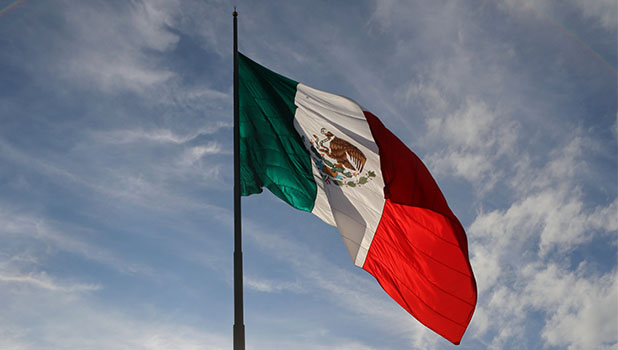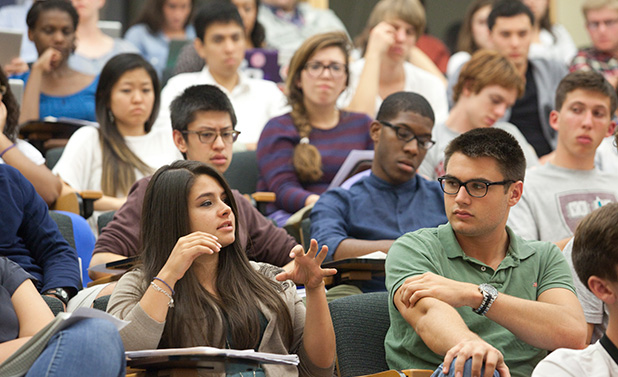Dear Members of the Harvard Community,
“What we lose in flowers,” Samuel Butler wrote of autumn, “we more than gain in fruits.” With another autumn upon us, I write to note some first fruits of the academic year now in full swing and some thoughts on what’s ahead.
As September began, our newest undergraduates assembled for one of Harvard’s newest traditions, the freshman convocation, and heard from Harvard’s newest dean, Rakesh Khurana. He urged our students to see their college years not as merely transactional, not as simply a four-year exercise in building resumes and gearing up for careers, but as transformational, as a once-in-a-lifetime opportunity to explore new interests and embrace the unfamiliar—to cultivate the creativity, the versatility, and the values that will shape the pattern of their lives. Dean Khurana’s talk affirmed one of Harvard’s most enduring commitments: to sustain and renew the liberal arts and sciences tradition, the wide-ranging, curiosity-driven pursuit of knowledge, in the face of trends toward seeing higher education in increasingly narrow and instrumental terms.
Harvard University · Harvard College Dean Rakesh Khurana at Freshman Convocation
If you are experiencing problems with this file, try listening at SoundCloud, or switch to Chrome, Firefox, Internet Explorer 11, and Safari browsers.
Just one week after the freshman convocation, I was privileged to join in celebrating a historic gift to benefit our School of Public Health, a school at the forefront of bringing academic understanding to bear on complex health issues confronting populations worldwide. The distressing Ebola crisis is only the latest reminder of why such work is so vital. At an event announcing his family’s gift, the largest ever to Harvard, Gerald Chan spoke movingly about his late father’s devotion to creating educational opportunity and his mother’s painstaking work as a nurse—how during his childhood she would administer cholera vaccines to neighborhood children at the family’s kitchen table in Hong Kong.

The generosity of the Chan family and its Morningside Foundation will enable generations of our faculty and students—at what will now be known as the Harvard T. H. Chan School of Public Health—to pursue research and education with incalculable promise to improve the lives of people in need.
Later in September, two of our schools—Design and Education—celebrated the launch of their parts of The Harvard Campaign. The first launch vividly showed how innovative design thinking is not only invigorating our longstanding programs in architecture and planning, but also infusing fresh energy and ideas into fields from engineering to the arts, from sustainability to global health. The second launch brought home how much we are now poised to learn about how we learn—and how formidable and important remain the challenges of improving education not only for our own students but for students everywhere.

If education that inspires creativity is our best hope for the future, we saw such hope on memorable display in watching a group of young musicians from the Conservatory Lab Charter School in Dorchester perform “Amazing Grace”—with the consummately graceful Yo-Yo Ma slipping up to the stage to make sure a cellist’s sheet music wasn’t swept away mid-performance by an impish afternoon breeze.
The day after the Ed School campaign launch, we celebrated the reopening of McKinlock Hall at Leverett House, beautifully renovated as part of our ongoing program to renew the undergraduate Houses.
Walking through the dining room and common rooms, the Old Library Theatre and the new gallery corridor, the basement art spaces and music practice rooms, one sees and feels the imaginative union of traditional and new that so often marks Harvard’s best efforts to bring about change. With the neo-Georgian precincts of Quincy and Leverett now renewed, with work on Dunster well under way, and with Winthrop next in line, we can start to glimpse a new era for residential life in Harvard College, with a revivified House system very much at its heart. Meanwhile, as part of our Common Spaces Initiative, plans are taking shape to add a new hub of Harvard community life, as the longtime Holyoke Center morphs into the Richard A. and Susan F. Smith Campus Center just steps from the Yard.
The day after we marked our latest House renewal milestone, our Board of Overseers assembled for its first meeting of 2014-15. As thousands gathered for the UN Climate Summit in New York, the Overseers focused on the crucial academic work by faculty members across Harvard to confront the challenge of climate change and to help shape the future of energy and the environment. A multidisciplinary panel of leading faculty—from science and engineering, law and policy, economics, business, and design—came together to discuss what Harvard is doing, and what more we can do through research and education, to help spur energy efficiency and speed the transition to cleaner, greener sources of fuel. The panelists’ work represents just a fraction of the collective efforts that our faculty, students, and staff are directing toward these urgent questions, and our new Climate Change Solutions Fund aims to accelerate their progress.

Next month, the doors of 32 Quincy Street will again swing open, welcoming the community to the magnificent new home of the Harvard Art Museums, their extraordinary collections now enhanced by Renzo Piano’s elegant design. The renovated and expanded building gives new form to the idea of a university art museum, a place not only where one can wander through galleries and see objects of beauty, but where scholars and students have the time and space to engage intensively with significant works, from the ancient to the contemporary, and where our museums become as integral to education and research as our classrooms, libraries, and labs. Come mid-November, I encourage you to visit when you have the chance.
There are, of course, many more notable events and developments near in view:
- I look forward to gathering with friends and alumni in Mexico later this month, England in January, and China next March, as we keep extending Harvard’s global reach.
- We have intensified our planning as well as enabling work for the Allston site that will eventually become home to much of our expanding School of Engineering and Applied Sciences.
- Harvard Medical School will launch its part of The Harvard Campaign in November, buoyed by a series of recent generous grants to its emerging Program in Therapeutic Science.
- The Faculty of Arts and Sciences is mounting its first full-scale review of the Program in General Education since its introduction in 2009, while the College embarks on important conversations about how best to assure that all members of our diverse undergraduate community experience Harvard as fully welcoming and inclusive.
- As so many Harvard researchers forge the future of scientific discovery, it’s worth highlighting one notable example reported just last week: the Harvard Stem Cell Institute’s breakthrough in generating massive quantities of insulin-producing beta cells from human embryonic stem cells—an exciting advance in seeking an effective treatment for type-1 diabetes.
- The American Repertory Theater has begun its new season featuring a quintet of world premieres—all of them, it happens, directed by women – amid our broader initiatives to invigorate the performing arts’ role in the life of the university.
- Our HarvardX initiative, now in its third year, is rolling out a new set of courses and modules on topics from poetry in America to the nature of contracts to the fundamentals of neuroscience, and a new Web portal features a growing Harvard-wide array of online offerings—meant both to enrich the learning of our degree students and to project Harvard’s educational reach far beyond our walls.
- Generous recent campaign gifts will help propel everything from financial aid in the College (special thanks again to Ken Griffin for his record-setting gift) to fellowships across the schools, from humanities scholarship to student entrepreneurship, from an arts laboratory at Radcliffe to campus renewal at the Harvard Kennedy School, from a center on metabolic diseases to a center for green buildings and cities, and professorships in areas as diverse as behavioral economics, religion and business, intellectual property, music, and physics.

A letter like this highlights the stuff of headlines. But for everything I’ve mentioned, I have doubtless neglected much more. Many of the most consequential things that will emerge from this academic year—the new insights, the new collaborations, the new ways of making some aspect of our world more intelligible or more humane—are things apt to originate out of public view. They will find their spark in the quiet of a study or seminar room, late some long night in a lab or rehearsal room, out in the field or in a chance conversation over lunch. As we take note of high-profile events and visible changes, I hope we can pause to appreciate even more the less conspicuous yet no less essential moments of learning and understanding that draw us together in this place—that challenge us each day to take full advantage of all it offers, and of all we can offer one another. Such fruits, beyond all others, are what will make this autumn, and this year, one to savor.
Sincerely,

Cambridge, Mass.
